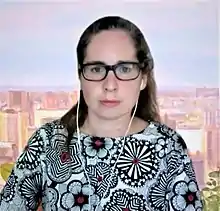Lauren Klein
Lauren Klein is an American academic who works as an associate professor, and director of the Digital Humanities Lab at Emory University.[1] Klein is best known for her work in digital humanities and for co-authoring the book Data Feminism with Catherine D'Ignazio.[2][3][4]
Lauren F. Klein | |
|---|---|
 Klein in 2020 | |
| Born | United States |
| Occupation | Associate Professor |
| Employer | Emory University |
| Known for | digital humanities, data feminism |
Early life and education
Klein studied comparative literature and computer science at Harvard University.[5] Before returning to graduate school, she worked as a software developer and bike messenger.[6] She received her Ph.D. in English and American Studies from the Graduate Center, CUNY in 2011.[7]
Career and research
Klein joined the School of Literature, Media, and Communication at the Georgia Institute of Technology as an assistant professor, where she taught in the Computational Media program. She also founded the Digital Humanities Lab there. Her lab’s work on the Shape of History project brought new attention to the forgotten data visualization scheme created by Elizabeth Palmer Peabody in the nineteenth century.[8] In 2017, she was named one of the "rising stars of digital humanities" by Inside Higher Ed.[9]
Klein’s research, which combines quantitative methods and archival research, proposes a way to "integrate race, gender, and postcolonial theory with computer learning to develop methodologies for performing research in bias-laden archives."[10] She is the author of An Archive of Taste: Race and Eating in the Early United States, which was published by the University of Minnesota Press.[11] She is the co-author, with Catherine D’Ignazio, of Data Feminism, which was published by MIT Press. Data Feminism was named a "must-read" book by WIRED Magazine and a 2021 PROSE Award finalist.[12][2][13] Klein is also co-editor, with Matthew K. Gold, of the Debates in the Digital Humanities book series, a "digital humanities bellwether" which offers a "hybrid model for open-access texts to be published in both experimental online spaces and traditional print forms."[14]
In 2019, Klein joined Emory University as an associate professor of English and Quantitative Theory and Methods.[15]
Works
- with Catherine D'Ignazio, Data Feminism (2020)
- An Archive of Taste: Race and Eating in the Early United States (2020)
References
- Fenton, Will (2 August 2017). "The New Wave In Digital Humanities". Inside Higher Ed. Retrieved 2020-11-06.
- Ellis, Emma Grey (2020-02-26). "WIRED's 13 Must-Read Books for Spring". Wired. Retrieved 2020-11-06.
- Dizikes, Peter (March 9, 2020). "'Data feminism' examines problems of bias and power that beset modern information". phys.org. Retrieved 2020-04-01.
- Romanek, Neal (2020-06-01). "Genius Interview: Lauren Klein". FEED.
- "Comp Lit News" (PDF). Department of Comparative Literature. Harvard University. 2013-10-01. Retrieved 2020-11-06.
- Goodman, J. David (2009-11-24). "An Outlaw Street Race, for a Good Cause". The New York Times. Retrieved 2020-11-06.
- "Alumni". American Studies. CUNY Graduate Center. Retrieved 2020-11-06.
- "DH Awards 2017 Results". Digital Humanities Awards: Highlighting Resources in Digital Humanities. Retrieved 2020-11-06.
- Fenton, Will (2017-08-02). "The New Wave in Digital Humanities". Inside Higher Ed. Retrieved 2020-11-06.
- Chun, Wendy Hui Kyong; Rhody, Lisa (2014). "Working in the Digital Humanities: Uncovering Shadows between the Dark and the Light". Differences. 25 (1): 1–25. doi:10.1215/10407391-2419985. Retrieved 2020-11-06.
- Diana DePasquale (2020-08-24). "An Archive of Taste: Race and Eating in the Early United States". New Books Network (Podcast). Retrieved 2020-11-06.
- Shukla, Prachi (2020-10-04). "Book Review: Data Feminism by Catherine D'Ignazio and Lauren F. Klein". LSE Review of Books. SAGE. Retrieved 2020-11-06.
- "Association of American Publishers Announces Finalists for 2021 PROSE Awards". Association of American Publishers. AAP. Retrieved 2021-02-08.
- "Debates in the Digital Humanities". University of Minnesota Press. Retrieved 2020-11-06.
- Hunt, April (2019-12-05). "New English faculty bring expertise in digital humanities". Emory News Center. Emory University. Retrieved 2020-11-06.